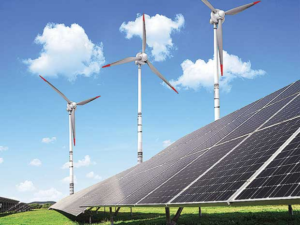
Buoyed by the bidding success of Rewa Ultra Mega Solar, the Union government wants state governments to offer guarantees to grid connected wind and solar projects. The guarantee is one of the three tiers of payment security mechanism which is in place for the Rewa project in Madhya Pradesh and is now been planned for adoption by other states.
The suggestion is part of new tariff-based competitive bidding guidelines for grid connected wind and solar PV power projects that the Union ministry for new and renewable energy plans to develop. The draft guidelines have been floated ahead of a two-day state power ministers’ conference starting Wednesday.
On February 10 this year, three projects of RUMS were bid out by the Madhya Pradesh government to Mahindra Renewables, ACME Solar Holdings and Solengeri Power’s Spring Energy at very low tariffs that work out to Rs 2.97 in the first year and an average of Rs 3.3 over 25 years of contract. Later on April 17, the three companies signed power purchase agreement with two procurers Delhi Metro Rail Corporation and Madhya Pradesh Power Management Company.
The MNRE has prepared these under section 63 of the Electricity Act, 2003 to create reassuring framework for investors.
The Government has up-scaled the target for overall renewable energy capacity by more than 5 times to 175 GW by the year 2022 which includes 100 GW from solar, 60 GW from wind, 10 GW from bio-power and 5 GW from small hydro-power.
Grid connected renewable power has seen a growth of 91.57 per cent with capacity addition of 22.5 GW during last three years (2014-15 to 2016-17), as compared to 11.7 GW installations during preceding three years (2011-12 to 2013-14). The cumulative installed capacity of grid renewable power has reached to 57.26 GW, which accounts for 17.52% of grid power from all resources. The aggregate 57.26 GW grid renewable power installed capacity includes 32.3 GW from Wind power, 12.3 GW from Solar power, 4.38 GW from Small Hydro Power and 8.31 GW from Bio-Power.
The termination clause of the model bidding norms says that in case of generator default damages as specified in power purchase agreement will be payable to the procurer. The procurer can take over the plant at 90 per cent of debt due.
When the default is with the procurer, generator can choose either the procurer takes over project assets, and pay the due debt due 150 per cent of adjusted equity, or the generator gets damages equivalent to 6 months, or balance PPA period, whichever is less, of charges for contracted capacity, and retains the assets. “Thus, the investment by Generator and the lenders is secured against any arbitrary termination of PPA,” said the draft.
The payment would be secured through provision for payment security commensurate to three months’ average billing, by way of letter of credit or payment security fund and state government guarantee.
The change in law clause would be effective from the last date of bid submission. Early commissioning and part commissioning have not only been allowed, but incentivised, by way of allowing the PPA for a minimum 25 years from the Scheduled Commissioning Date. Thus, there will be increase in the PPA term, corresponding to this early commissioning of full/part capacity.
With RUMS agreement as the model, the penalties have been rationalised, so as to reduce the overall cost to the generator, while at the same time, ensuring compliance with the commissioning schedule/scheme guidelines.
The scope of the guidelines include long term procurement of electricity from grid connected wind and solar PV power projects having size of 5 MW and above, through competitive bidding, by the Central Government/ State Governments, Central PSUs/ State PSUs/ other Public Sector Organisations, distribution licensees, as ‘Procurer’.
Bids have been allowed in Power (MW) and also on Energy (kWh) terms for solar PV, thereby ensuring better utilisation of resources.
The ‘Must-run’ status for wind and solar projects stressed upon through minimum compensation 50 per cent of PPA Tariff in case of back-down and compensation by way of procurement of excess generation/outright compensation due grid unavailability.
By: Jyoti Mukul
Source: www.business-standard.com


















